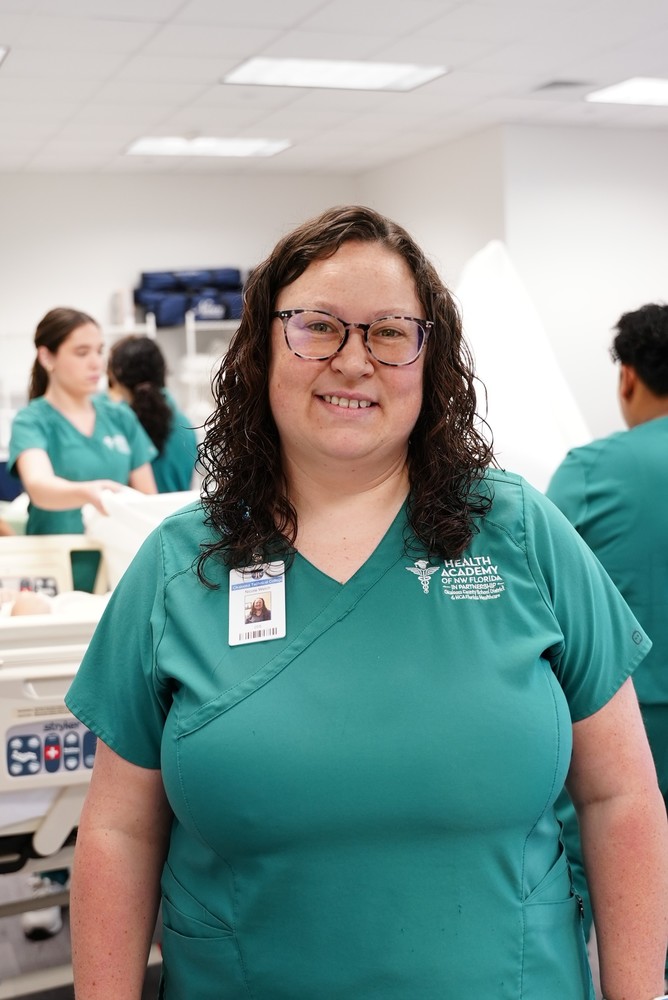In an inspiring conversation with Nicole Welch, a seasoned healthcare professional with nearly two decades of experience, we explored the dynamic world of high school medical education and the innovative approaches shaping the future of healthcare training. With a background spanning roles from Certified Nursing Assistant to Licensed Practical Nurse and leadership positions, Nicole Welch brings a wealth of real-world expertise to teaching high school students at the Health Academy in Fort Walton Beach. This interview dives into their journey, teaching philosophy, and vision for preparing students for rewarding careers in healthcare.
Q: Can you describe your experience and background in the medical field and how it informs your approach to teaching a high school medical course?
I started my healthcare career in 2006 as a Certified Nursing Assistant (CNA), later becoming a Certified Medication Aide and then a Licensed Practical Nurse. Over the years, I have worked in a variety of settings to include long-term care, skilled nursing facilities, an assisted living facility and a hospital on a medical-surgical floor. I have worked in several different positions, starting at the entry level and advancing into management. These experiences have given me a deep understanding of patient care across different populations and levels of acuity.
Q: How do you incorporate hands-on learning or practical applications, such as simulations or labs, into your health science lessons?
I bring the healthcare environment into the classroom through realistic simulations and labs that mirror actual medical settings. For example, students practice skills like taking vital signs, administering first aid, or using medical equipment in controlled scenarios. These activities are paired with case studies that challenge students to apply their knowledge critically and collaboratively. My aim is to make learning active and relevant, showing students how their skills translate to real patient care. I also integrate technology, like simulation software, to give students a modern, hands-on experience that prepares them for advanced training or careers.
Q: What strategies do you use to engage students who may be intimidated by complex medical terminology or concepts?
I focus on making learning approachable and interactive. I start by breaking terms into prefixes, roots, and suffixes so students can decode meanings instead of memorizing. I also use visuals and real-life analogies to make ideas easier to relate to. Activities like medical terminology bingo keep lessons engaging and fun. I make sure to reinforce vocabulary in the lab, so students see how terms are used in real healthcare situations.
Q: What are your aspirations for the skills, knowledge, and experiences students will acquire through your program?
My top priority is to prepare students to enter the field with confidence, compassion, and a clear understanding of what quality patient care looks like.
Q: What role do you believe the health academy plays in preparing students for post-secondary education or careers in healthcare?
The Health Academy is a vital stepping stone. It introduces students to the fundamentals of medical terminology, anatomy, physiology, and patient care while developing their professional skills like teamwork, communication, and ethical decision-making. Our program provides a strong academic foundation, but it’s the real-world exposure that sets students apart. By simulating healthcare scenarios and fostering critical thinking, we prepare students to confidently pursue further education or enter the healthcare field directly. The academy also emphasizes compassion and ethical responsibility, ensuring students are not just skilled but also caring professionals.
Nicole Welch’s passion for healthcare education shines through in every aspect of their teaching. By blending real-world experience with innovative, hands-on learning, they are equipping students with the skills and confidence to excel in the healthcare field. The health academy at the Health Academy is more than just a classroom—it’s a launchpad for compassionate, capable professionals ready to make a difference. As Nicole Welch continues to inspire and educate, the future of healthcare looks brighter than ever.

